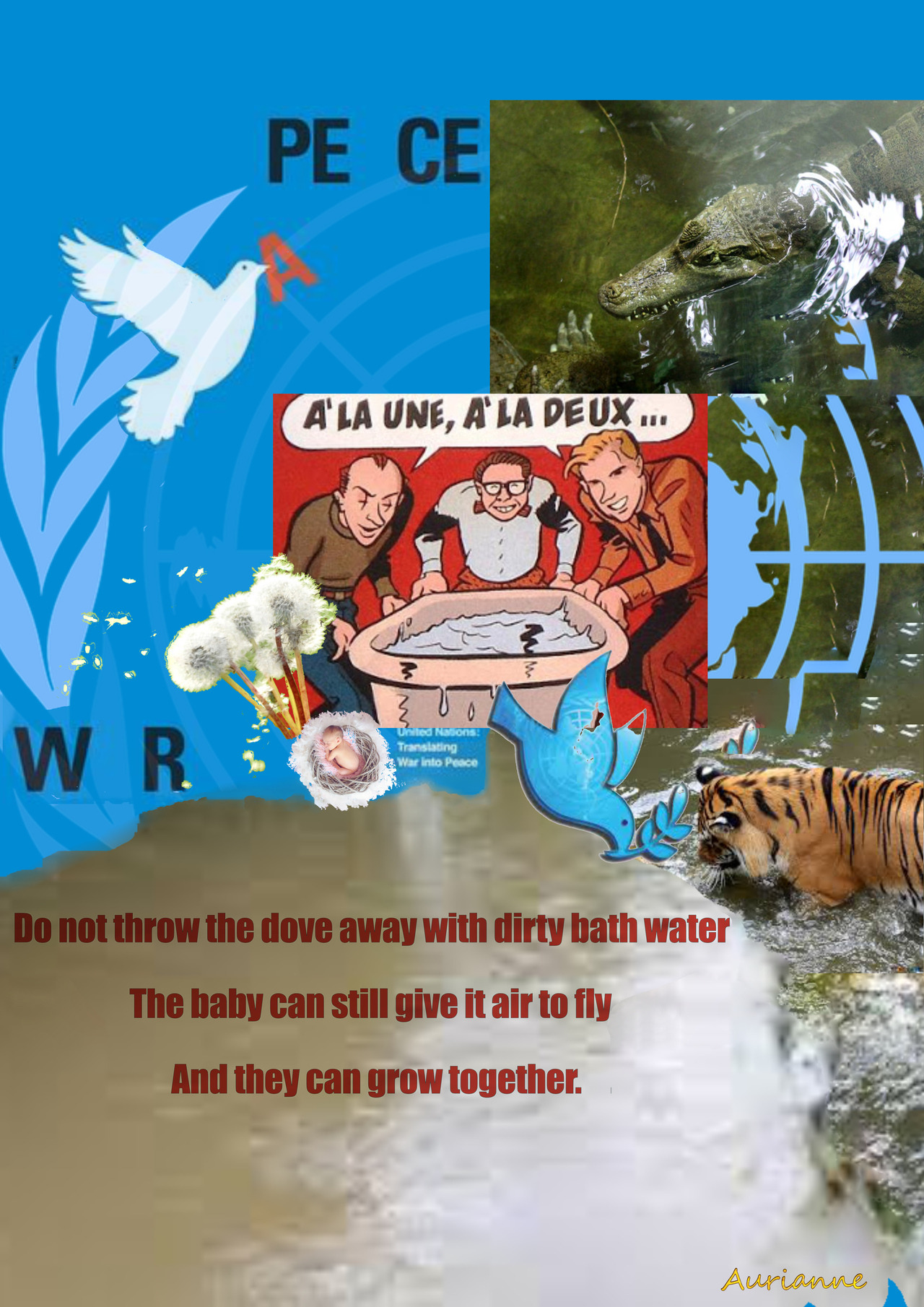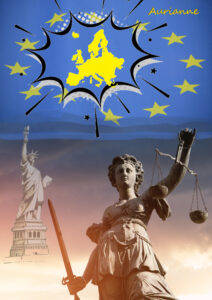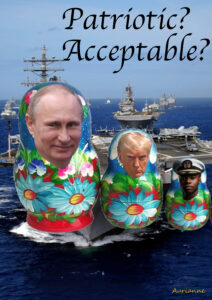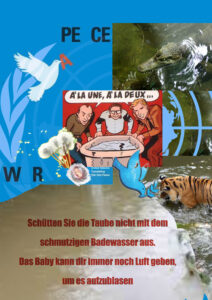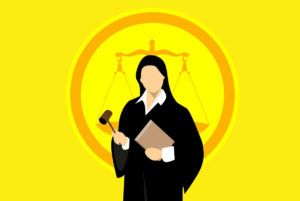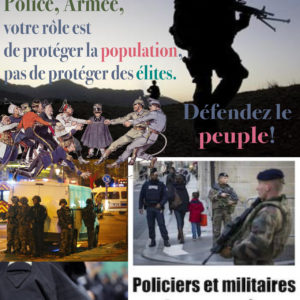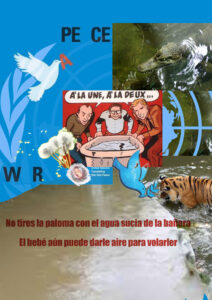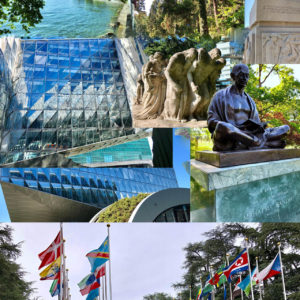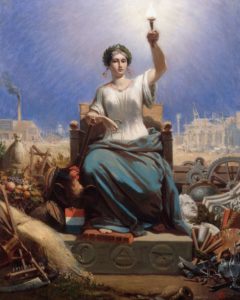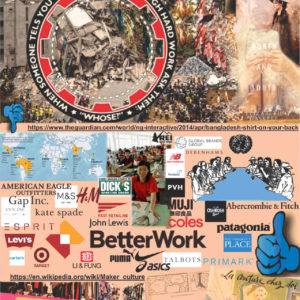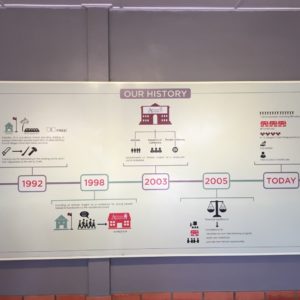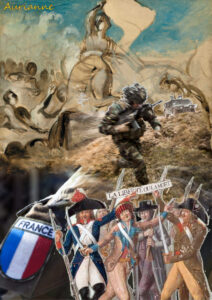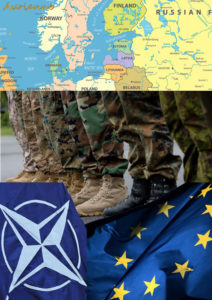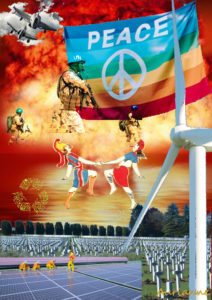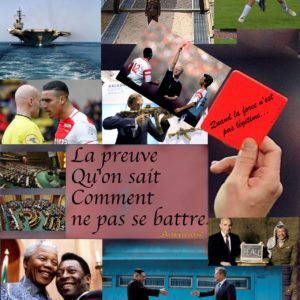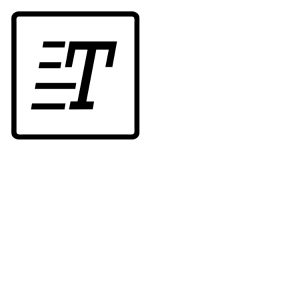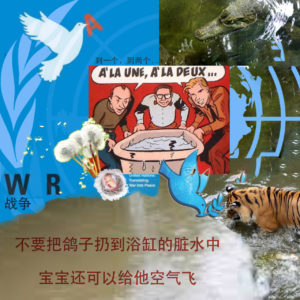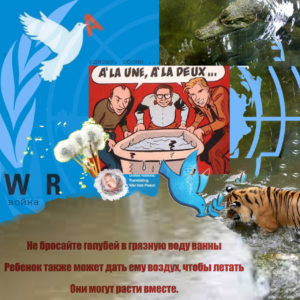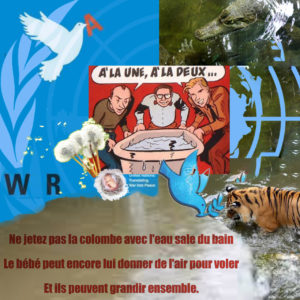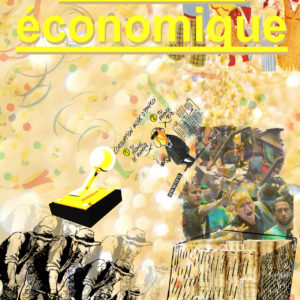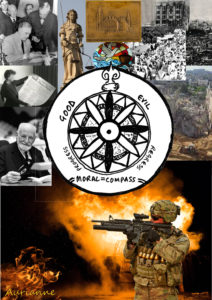In 1961, Secretary General Dag Hammarskjöld’s plane, which wanted to establish a UN right of interference in Katanga (Congo), crashed. The square in front of the General Secretariat in New York still bears his name.
Man accused of shooting down UN chief: ‘Sometimes you have to do things you don’t want to …’ – The Guardian: https://www.theguardian.com/world/2019/jan/12/former-raf-pilot-shot-down-un-chief-dag-hammarskjold-1961-plane
Dag Hammarskjöld’ – UN: http://www.un.org/depts/dhl/dag/time1960.htm
The project to establish a right of interference falls through. This means that the UN cannot intervene when a conflict occurs within a country. It can only intervene when one country declares war on another.
Paix – Wikipedia: https://fr.wikipedia.org/wiki/Paix#Paix_internationale
The UN is therefore not intervening, or too late, in the Democratic Republic of Congo, Yugoslavia, Rwanda, Chechnya or Syria.
Droit d’ingérence – Monde diplomatique: https://www.monde-diplomatique.fr/mav/49/VIDAL/55555
In cases such as Haiti or East Timor, the UN intervenes when it is an internal conflict. This is because there is no commercial interest that puts pressure on the presidents of the USA, France, Russia, China and the United Kingdom. This is important because they are the ones who are part of the security council.
L’usage de la force par l’ONU – CAIRN info: https://www.cairn.info/revue-pouvoirs-2004-2-page-111.htm
Bernard Kouchner relaunches the idea of the UN’s right of interference. He has not enough support and the idea falls through again.
Bernard Kouchner – Wikipedia: https://fr.wikipedia.org/wiki/Bernard_Kouchner#Devoir_d’ing%C3%A9rence
Several conflicts erupt without the UN intervening or, on the contrary, making the situation worse. This makes the institution less credible. Horrible massacres such as in Sebrenica or Aleppo are taking place.
Srebrenica 20 years after the genocide: The Dutch peacekeepers still haunted by memories of the massacre – Independant:
https://www.independent.co.uk/news/world/europe/srebrenica-20-years-after-the-genocide-the-dutch-peacekeepers-still-haunted-by-memories-of-the-10378913.html
« La tragédie syrienne sera-t-elle le tombeau des Nations unies ? » – Le Monde: https://www.lemonde.fr/idees/article/2018/03/30/la-tragedie-syrienne-sera-t-elle-le-tombeau-des-nations-unies_5278740_3232.html
So why do I still have confidence and why do I have my hopes for the UN?
Since the creation of the UN, the risk of dying from violent aggression has collapsed. The number of countries that have declared war to another has also fallen. The number of injured, maimed and dead is much lower in internal conflicts than in conflicts between countries.
It is a fact that peace has progressed thanks to the UN: Deaths in state-based conflicts by region – Our world in data: https://ourworldindata.org/grapher/battle-related-deaths-in-state-based-conflicts-since-1946-by-world-region
The very idea of the duty of interference is gradually gaining ground in the face of state sovereignty. Souveraineté – Wikipedia: https://fr.wikipedia.org/wiki/Souverainet%C3%A9#Les_limites_%C3%A0_la_souverainet%C3%A9_issues_des_organisations_intergouvernementales
But the UN does much more for peace, helping people to live better.
The results on child labour, slavery and women’s rights are staggering. No one can deny the effectiveness of WHO, which has been directly involved in the eradication of certain diseases. Who could criticize UNICEF?
Various measures of child labor incidence, 1851 to 2012 – Our world in data: https://ourworldindata.org/grapher/various-measures-of-child-labour-incidence
Legal Slavery – Gap minder: https://www.gapminder.org/data/documentation/legal-slavery
Share of women who were married by age 18– Our world in data: https://ourworldindata.org/grapher/women-married-by-age-18?tab=chart
Life expectancy at birth – Our world in data: https://ourworldindata.org/grapher/life-expectancy-globally-since-1770
Smallpox: when was it eliminated in each country? – Our world in data: https://ourworldindata.org/grapher/decade-in-which-smallpox-ceased-to-be-endemic-by-country
When I was 2 years old, 50% of people in the world lived in extreme poverty. Today, it’s 9%. – Melinda Gates – Twitter: https://mobile.twitter.com/melindagates/status/981236431770157057
The introduction of indicators has served as a lever for States to face up to their real actions, and not those of their propaganda.
The UN is effective. The UN is still in its infancy.
Some are frustrated because they do not intervene in internal conflicts; let us mobilize to ask for interference!
Let us also ask the institution to measure the progress of democracy through a popular initiative referendum indicator (e.g. how many there have been, results respected): SDG Tracker – Our world in data: Measuring progress towards the Sustainable Development Goals – https://sdg-tracker.org/
The current UN Secretary General is a man of courage who fought against the Salazar dictatorship in Portugal. He will surely listen to the requests made to him. With popular support, it will be easier for him to convince the powerful ones:
The New UN Secretary-General Is a Portuguese Socialist Who Speaks Out for Refugees – In these times: http://inthesetimes.com/article/19820/united-nations-secretary-general-antonio-guterres-refugees-multiculturalism
Giving priority to peace also means making better use of public money by freeing the institutions from lobbies which press for their commercial interests, before peace is established:
Peace Is the Best Investment – FP: https://foreignpolicy.com/2018/09/24/peacekeeping-cant-be-done-on-the-cheap-united-nations-secretary-general-antonio-guterres/
Secretary-general to throw entire UN into fight against ‘suicidal emissions’ – Climate own News: http://www.climatechangenews.com/2018/09/10/secretary-general-throw-entire-un-fight-suicidal-emissions
It’s very important for the UN to have people who support them. We are not alone. More and more groups around the world are pushing to help this popular referendum project to emerge in the face of the increasingly autocratic tendency of ‘liberal democracies’ to have people decide for others. The UNDP (United Nations Development Programme) is concerned by these issues.
V-DEM is a department of the University of Gothenburg, Sweden. It officially provides indicators and statistics for the United Nations Sustainable Development Goals 16 (related to peace, justice and strong institutions).
The V-DEM Annual Report 2017: https://www.v-dem.net/media/filer_public/91/14/9114ff4a-357e-4296-911a-6bb57bcc6827/v-dem_annualreport2017.pdf
The UN has already collaborated in 2015 with the V-DEM cabinet to consider the measurement of the referendum on popular initiative. V-DEM provided statistics for the SDG in 2015 in a very technical report: Measuring the Potential of Direct
Democracy Around the World (1900-2014) – VDem Institute: https://core.ac.uk/download/pdf/43561144.pdf
This index measures:
(1) the ease with which each type of popular vote can be initiated and approved, and
(2) the importance of this vote (if approved).
The ease of initiation is measured by:
(a) the existence of a process of direct democracy,
(b) the number of signatures required; and
© the time limits for collecting signatures.
The ease of approval is measured by the quorums relating to domain names in :
(a) participation,
(b) approval,
© the supermajority, and
(d) a majority of the district.
With regard to the importance of the vote, it examines its decisive nature (whether the decision is binding or not) and the threatening capacity of direct democracy mechanisms at the initiative of citizens, measured by the frequency with which direct popular votes have been used and approved in the past. Finally, the study tests the validity of the new measure, discussing its strengths and limitations.
The next revision of the indicators of SDG 16 (Peaceful and inclusive societies) will be in July 2019 with the opportunity to include the direct democracy indicator. If the project does not pass, the next chance to ask for a referendum on a citizens’ initiative at the UN will be in 2030.
https://sustainabledevelopment.un.org/hlpf/2018
Is the world getting better or worse? A look at the numbers | StevenPinker |TEDTalks | https://youtu.be/yCm9Ng0bbEQ
How We Can Make the World a Better Place by 2030 | MichaelGreen | TEDTalks: https://t.co/BnGtJVraZx
United Nations General Assembly Resolution 377: https://youtu.be/AkTTpreLvNg
L’ONU interdit à la France l’usage des grenades et lanceurs de balles car cette violence d’Etat dissuade les gens de manifester pacifiquement.
Rights of ‘gilets jaunes’ protesters in France, ‘disproportionately curtailed’, say UN independent experts | UN News
https://news.un.org/en/story/2019/02/1032741
Si vous avez la chance d’être protégé par votre statut ou votre pays, vous avez le devoir de vous en servir: http://chng.it/DHtc8HMV

